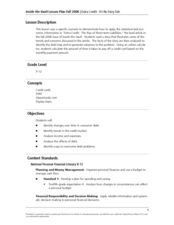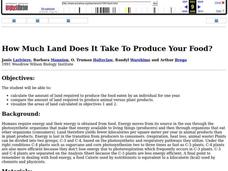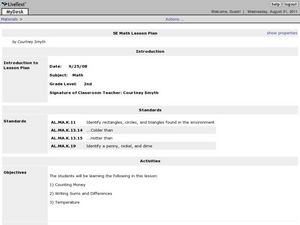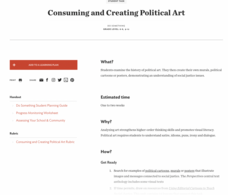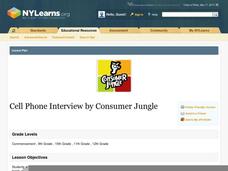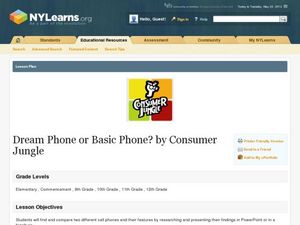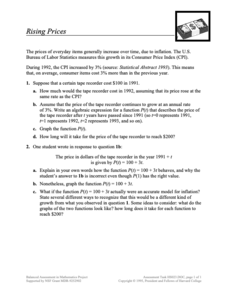Curated OER
Extra Credit: It’s No Fairy Tale
Students discuss their knowledge of payday loans and credit cards. In this Economics lesson, students complete a read an article and Q&A activity in groups, and play a vocabulary bingo game and a quiz game on payday loans. Students...
Safe Drinking Water Foundation
Water Bottles Everywhere
Young environmentalists examine how water bottle use is polluting the waters on our earth. In groups, your students study the handout on their assigned topic and present their findings to the rest of the class. Leading up to this lesson,...
Curated OER
The Great Cookie Company
Fourth graders implement real life application of money, problem solving, economics, and consumer awareness. In this three week economics unit, 4th graders operate a business, write checks, balance accounts, and market their product.
Curated OER
How Much Land Does It Take To Produce Your Food?
Students calculate the amount of land required to produce the food eaten by an individual for one year. They compare the amount of land required to produce animal versus plant products. Students visualize the areas of land calculated.
Curated OER
Food Chains
Fourth graders study food chains, producers, consumers, and decomposers. They play a food chain game and create food chain mobiles or posters. They take a nature hike around the school and observe various parts of a food chain.
Curated OER
Counting Money Activity
Second graders explore commerce by practicing monetary transactions. In this consumer math lesson, 2nd graders practice using math functions to add and subtract different amounts of money. Students identify the different monetary units...
Science Matters
Energy Flow
Budding scientists work collaboratively to reenact energy flow in a food chain. Scholars take on roles such as producer and consumer and perform tasks that symbolize energy flow in order to provide evidence of how much energy passes...
It's About Time
Who Eats Whom?
Packed with visual aids and multiple learning opportunities, an engaging exercise challenges individuals as they explore the role of producers, consumers, and decomposers. After discussing differences between food chains, food...
Federal Reserve Bank
The Fed's Role in Making and Setting Monetary Policy: Part 1
How does inflation affect the economy, and how can effective monetary policy by the Federal Reserve help control inflation? With the Fisher equation and analysis of annual CPI rates during the 1970s and early 1980s, your class members...
Teaching Tolerance
Consuming and Creating Political Art
A picture is worth a thousand words, but political art may be worth even more! After examining examples of political cartoons, murals, and other forms of public art, class members create their own pieces to reflect their ideals and...
Federal Reserve Bank
Purchasing a Vehicle
Start your engines! Prevent negative car buying experiences by arming pupils with information. Prepare your young drivers to make informed decisions when they are ready to purchase a car. All aspects are considered from the type of car...
Chicago Botanic Garden
Nature Walk and Ecosystem Introduction
A food web has no organism higher than a tertiary consumer because there wouldn't be enough energy left to sustain them. The fourth installment in a seven-part series begins with a nature walk to get pupils thinking about their...
Science Matters
Matter Cycles — Sum It Up
Scholars become part of the cycle of matter with a reader's theater that showcases producers, consumers, decomposers, and the sun. A diagram and discussion concludes the learning experience and enhances comprehension.
Global Oneness Project
Living with Less Water
Did you know that California produces two thirds of the fruits and nuts consumed in the United States? That it produces almost one third of the vegetables? Did you know that scientists warn that California is facing the onset of a...
Howard Hughes Medical Institute
The Making of the Fittest: Got Lactase? The Co-evolution of Genes and Culture
Got milk? Only two cultures have had it long enough to develop the tolerance of lactose as an adult. Learn how the responsible genes evolved along with the cultures that have been consuming milk. This rich film is supplied with a few...
Curated OER
Fighting Fake News
Fake news. Alternative facts. Internet trolls. In an age of Newspeak, it's increasingly important to equip 21st century learners with the skills needed to determine the legitimacy of claims put forth on social media, in print, and in...
Curated OER
Insurance Quotes
You're in high school and you just got the coolest car ever! But, now you need to start thinking about car insurance. Luckily, your teacher prepared you by engaging you in a life skills lesson like this one. The class actually calls...
Curated OER
All The Bell & Whistles
Young adults are so eager to get that first cell phone. And, cell phones have so many cool extras! Learners conduct real-life research to determine which cell phone carrier offers the best deals on things like wall paper, ringtones, and...
Curated OER
Cell Phone Interview
Are there benefits to comparison shopping? Yes, even with cell phones. It's important to know which carrier is best and why. Learners interview a family member about his choice in cell phone carriers, and compare that person's choice to...
Curated OER
Dream Phone of Basic Phone?
Learning to be a savvy shopper can make or break the bank. Upper graders research five different cell phone carriers to see if they'll have enough money in their imaginary budget for a dream phone or a basic phone. They create either a...
Curated OER
Rental Agreement Lingo
The first time you sit down to sign a rental agreement is quite an experience. Prepare your class for that inevitable moment with a lesson on rental agreement lingo. They read a rental agreement, fill out a lingo worksheet, and then...
Curated OER
Surviving or Thriving with Roommates
Living on your own is hard, especially when you have to live with roommates. Discuss the importance of shared living situations and how to make them as good as possible with your class. They brainstorm what makes a good roommate, ways to...
Curated OER
Debt: Who Does it Affect?
Debt is a topic that affects everybody: the community, the nation, and the entire globe. Kids take charge of debt by designing a project that informs those in their community about good financial choices, keeps personal debt low, and...
Concord Consortium
Rising Prices
What will that cost in the future? The scenario provides pupils with a growth as a Consumer Price Index. Learners create functions for a given item to determine future prices and graph them. Class members then compare their functions to...


